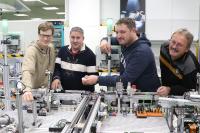 Oppenweiler, 29.04.2019 (PresseBox) - The Tettnang Electronics College focuses on practical, real-world applications. The newly opened iLearningFactory 4.0 is an entire production chain for packing plastic chips and is realistically simulated. Students enjoy hands-on experience of what Industry 4.0 is all about. Murrelektronik places a lot of value on young professionals receiving the highest education – which is why we support such a ground-breaking innovative project by supplying the hardware components for the automation system. Murrelektronik also assisted in an advisory capacity with the planning stage.
Oppenweiler, 29.04.2019 (PresseBox) - The Tettnang Electronics College focuses on practical, real-world applications. The newly opened iLearningFactory 4.0 is an entire production chain for packing plastic chips and is realistically simulated. Students enjoy hands-on experience of what Industry 4.0 is all about. Murrelektronik places a lot of value on young professionals receiving the highest education – which is why we support such a ground-breaking innovative project by supplying the hardware components for the automation system. Murrelektronik also assisted in an advisory capacity with the planning stage.Around 1,000 students attend the Tettnang Electronics College. They receive basic and further training in automation technology, electrical engineering and information technology. This degree of specialization is unique to Germany. So it is no coincidence that many electrical engineering companies have popped up around the college. Many companies have recruited talented young engineers from Tettnang. Some students attend the electronics school full time, others attend part time which is a component of the integrated study program: work during the day and go to school in the evenings and on the weekends. Because this type of educational environment is unique, the college is keen to make study as attractive as possible for the students. This applies to the teaching times, close cooperation with companies, and the material, which strives to fascinate, inspire and motivate students.
Recently, Tettnang Electronics College applied to the State Ministry of Economic Affairs, Labour and Housing Construction (in Baden-Württemberg) to establish training factories at vocational colleges. These training factories would focus on the practical education of skilled workers and young professionals to meet the requirements of the digital age. The electronics college won the call for the laboratory and received funding from the state and Lace Constance regional government. The investment totals €1.1 million. It was then up to the electronics college to seek industrial partners in for the project. However, the idea was not to collect checks, but to ask companies for products and components, their time and know-how to get the iLearningFactory 4.0 up and running. The laboratory was officially inaugurated at an opening ceremony in October 2018.
The production lab includes automation components from many manufacturers, which is ideal, says teacher Christian Schick: “We want the students to see and understand how different components interact.” The installation consists of six modules with numerous sensors and actuators. They operate on a cooperative basis and pack plastic chips into containers – based on an order entered via web interface. Operations are highly varied, with containers of different shapes, sizes and colors, requiring a high level of flexibility from the automation solution.
Murrelektronik supports the iLearningFactory 4.0 with our hardware components. Our Cube 20S fieldbus station and compact Cube20 fieldbus modules electrically connect the sensors and actuators to the control system. These systems offer high signal density, enabling many channels to be connected in limited space. The students learn how to terminate individual wires on these IP20 modules. Thanks to the modular design of the Cube20S, additional modules can be added quickly and easily when more modules are integrated into the installation. Cube67 fieldbus system modules are installed to effectively integrate sensors and actuators that are located further away from the core area of the installation. By building the I/O modules in close to the operational process, cordsets can be shorter when incorporating components into the system. Pre-wired M8 and M12 connection technology minimize the risk of wiring errors. Murreletronik's Impact67 compact fieldbus module is also part of the installation solution: it provides another way of cost effectively incorporating sensors and actuators into the installation.
Students focus on practical aspects at the iLearningFactory 4.0. They tackle tasks that they will also have to deal with as part of routine operations in the real-world. This might include, for instance, students being given the task of integrating new components, signal towers or even an entire supply module into the iLearningFactory 4.0 to increase the automation level. Some other real-world examples: How to replace a piece of equipment in the installation without causing a long downtime, which would be very costly? How can processes within the installation be visualized to identify whether signaling between the individual elements is working perfectly? How can a predictive maintenance solution be integrated into the installation?
“Many of the automation projects we tackle with our students on the installation side are identical to those in their day or future jobs,” says teacher Andreas Greck, identifying an interesting aspect for companies that have provided material for the iLearningFactory 4.0: “The students work with the components and get to know them. When they have to opt for the products of manufacturers on the job, then, of course, they prefer ones they know and have found to be good.”
Jürgen Zeltwanger, CSO/CTO of Murrelektronik, is happy to sponsor this ambitious and unique college and its teaching staff: “We support the electronics college's iLearningFactory 4.0 because we want students to enjoy the best possible training. And the college in Tettnang succeeds in doing this with its impressive practical applications.”
